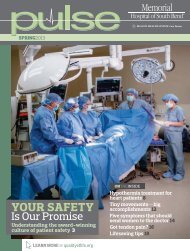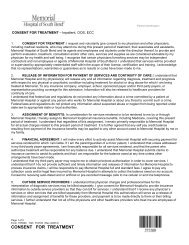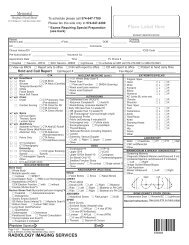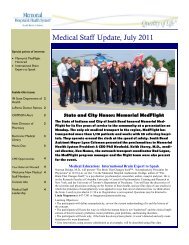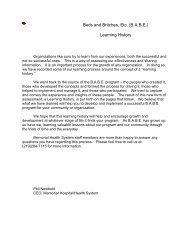Spring 2008 - Memorial Hospital of South Bend
Spring 2008 - Memorial Hospital of South Bend
Spring 2008 - Memorial Hospital of South Bend
Create successful ePaper yourself
Turn your PDF publications into a flip-book with our unique Google optimized e-Paper software.
“I can’t overemphasize the rigorous<br />
training our Black Belts and Green<br />
Belts went through. GE’s training<br />
was months-long, data-driven, heavy<br />
on critical thinking and decisionmaking<br />
and very intensive,” says<br />
Matt Krathwohl, executive director<br />
<strong>of</strong> Performance Excellence<br />
(<strong>Memorial</strong>’s brand for process<br />
improvement that includes Lean<br />
and Six Sigma tools). “Now our<br />
Black Belts and Green Belts are<br />
applying that learning to real life<br />
challenges at <strong>Memorial</strong>.”<br />
“I was the director <strong>of</strong> the pharmacy<br />
when I took this position,” says Black<br />
Belt Jim Goshert. “It’s definitely<br />
unlike anything I’ve ever done<br />
before. In fact, I wish I had done this<br />
a long time ago. It would have been<br />
useful in my role as a manager.<br />
The things you learn can be applied<br />
to improve and control processes<br />
in any department.”<br />
Using Six Sigma principles, Goshert<br />
and his team took on the task <strong>of</strong><br />
improving case cart accuracy for<br />
<strong>Memorial</strong>’s surgical team. It was<br />
one <strong>of</strong> five training projects that<br />
the Performance Excellence team<br />
members undertook at <strong>Memorial</strong><br />
after completing their certification.<br />
By ensuring the timely and correct<br />
presentation <strong>of</strong> surgical instruments,<br />
patients are less likely to be delayed<br />
or rescheduled, making a better<br />
experience for everyone.<br />
Some surgeries require an enormous<br />
amount <strong>of</strong> equipment. In the past,<br />
the Sterile Processing Department<br />
would ensure surgery received all<br />
case carts by 6 a.m. With all that<br />
equipment around, nurses, doctors<br />
and staff barely had enough room<br />
to walk the hallways. Now that the<br />
improved process only allows for<br />
10 case carts at a time, it opened<br />
up that area tremendously.<br />
“Another type <strong>of</strong> issue can occur<br />
when say two or three hip surgeries<br />
are scheduled for one day,” says<br />
Goshert. “Now say each <strong>of</strong> those<br />
surgeries require the same piece<br />
<strong>of</strong> equipment, an item we only have<br />
one <strong>of</strong>. Throw in the fact that this<br />
equipment needs to be sterilized<br />
after each surgery. Now these highdemand<br />
pieces are highly trackable,<br />
with one dedicated Sterile Processing<br />
representative to handle calls.”<br />
Safety has improved not just in<br />
surgery but for all employees<br />
working in that area <strong>of</strong> the hospital.<br />
Preparing carts closer to surgery<br />
time helps decrease clutter and<br />
reduce the likelihood <strong>of</strong> incomplete<br />
carts and delayed surgeries.<br />
Financially, this project saves<br />
<strong>Memorial</strong> $1,231 per week,<br />
or $64,000 per year.<br />
“I have strongly supported this<br />
project from the beginning,” says<br />
Jayne Mitton, R.N., executive<br />
director <strong>of</strong> Surgical Services.<br />
“As with all projects, the process<br />
is still a work in progress, but has<br />
a tremendous potential, and it<br />
shows great collaboration<br />
between departments.<br />
“An added bonus is that anytime<br />
you’re trying to improve processes,<br />
you’ll find something else you<br />
can improve upon,” says Mitton.<br />
“It’s helped us see other areas<br />
for improvement, which is<br />
always helpful.”<br />
“My team on the surgery cart case<br />
was outstanding,” says Goshert.<br />
“Johan Kuitse, Mark Wilson, Darla<br />
McAllister and Greg Piper, who was<br />
a co-sponsor with Jayne Mitton.<br />
They are so energetic about this<br />
process. They are the reason we<br />
made this happen. I can’t say<br />
enough about them.”<br />
Never Stop Learning<br />
<strong>Memorial</strong>’s Black Belts and Green<br />
Belts have earned a certificate <strong>of</strong><br />
achievement for successfully completing<br />
the Lean Six Sigma Black Belt and<br />
Green Belt Development Program.<br />
Black Belts<br />
Diane Freel<br />
Carey Gaudern<br />
Jim Goshert<br />
Sandy Kowalski<br />
Tom Merry<br />
Green Belts<br />
John Albright<br />
Ken Anderson, D.O.<br />
Cindy Crawford<br />
Yolanda Emley<br />
Matt Krathwohl<br />
Johan Kuitse<br />
Darla McAllister<br />
CJ Paulausky<br />
Julie Phillips<br />
Greg Piper<br />
Barb Ponder<br />
Tracee Siade-Jones<br />
David Sipp<br />
Janet Sipp<br />
Deidra Turner<br />
Mark Wilson, R.N.<br />
He also couldn’t say enough about<br />
the partnership with GE that has<br />
made all <strong>of</strong> this possible. “If<br />
<strong>Memorial</strong> can continue to use this<br />
training, and get even more and<br />
more people trained, we will have<br />
a brighter future,” says Goshert.<br />
“Because every process we improve<br />
in our individual departments<br />
improves <strong>Memorial</strong>.”<br />
SPRING / SUMMER <strong>2008</strong> › www.quality<strong>of</strong>life.org<br />
013





